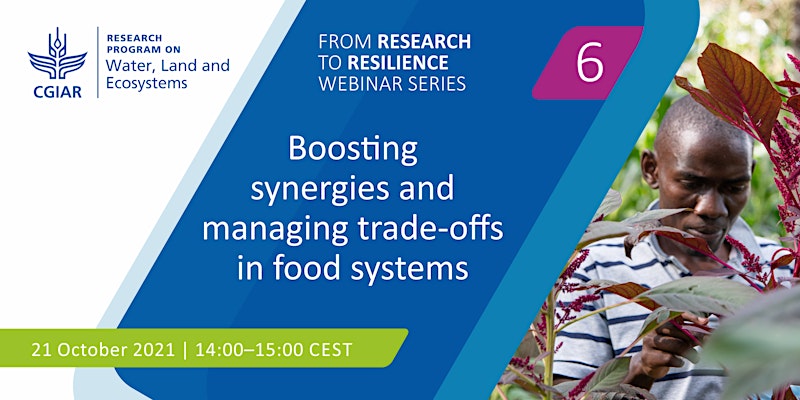Our climate, biodiversity and food systems are inextricably linked. This webinar discusses evidence, actions and lessons learned on how to leverage biodiversity in our food systems for people and planet.
Our climate, biodiversity and food systems are inextricably linked. Food systems cause huge biodiversity losses, account for about one-third of greenhouse gas emissions, and leave 2 billion people with unhealthy diets, even as 40% of all food produced goes uneaten. The ways we feed ourselves – through just a few crops and animals – are unsustainable for people and planet.
How can we actively strengthen synergies and better manage trade-offs between social, economic and environmental outcomes of food and agricultural systems?
This webinar presented and discussed insights, tools and forward-looking actions from the CGIAR Research Program on Water, Land and Ecosystems (WLE), with case studies and lessons learned from Africa, Asia and Latin America.
The webinar focused on the following:
How can we actively strengthen synergies and better manage trade-offs between social, economic and environmental outcomes of food and agricultural systems?
This webinar presented and discussed insights, tools and forward-looking actions from the CGIAR Research Program on Water, Land and Ecosystems (WLE), with case studies and lessons learned from Africa, Asia and Latin America.
The webinar focused on the following:
- What are the leverage points for strengthening synergies between biodiversity, climate and food systems agendas, at local and global scale?
- How can we better anticipate, assess and manage synergies and trade-offs between social and environmental outcomes of our food and agricultural systems?
- What are short- and longer-term actions that can be taken at local and global scale to help boost synergies and manage trade-offs in food and agricultural systems?
- What capacity is needed for this?
- Dr Roseline Remans, Co-Leader of Enhancing Sustainability across Agricultural Systems research theme, WLE (Alliance of Bioversity international and CIAT)
- Dr Fabrice DeClerck, Science Director, EAT Forum & Senior Scientist, Alliance of Bioversity International and CIAT
- Dr Wei Zhang, Senior Research Fellow, Environment and Production Technology Division, IFPRI
- Dr Pablo Tittonell, Principal Investigator, CONICET-INTA & WWF Chair, Resilient Landscapes for Nature and People, Groningen University, The Netherlands
- Dr Alejandra Martinez-Salinas, Research Associate, Tropical Agricultural Research and Higher Education Center (CATIE)
- Ms Emeline Fellus, Director, Food Reform for Sustainability and Health (FReSH), World Business Council for Sustainable Development (WBCSD)
- Mr Webster Isheanopa Makombe, Youth Leader, Act4FoodAct4Change
Background:
Held strategically between the UN Food Systems Summit (UNFSS) and the UN Climate Change Conference (COP26), the webinars will identify evidence gaps, capture lessons learned and consolidate thinking on the future direction of research for development to sustainably transform our water, land and food systems.Webinar #1 – 05/10 Accelerating clean energy access in rural areas
- Presenting WLE energy research that can help countries enhance smallholder access to clean energy, address climate adaptation/mitigation challenges, and transform food, land and water systems.
- Find out more and watch the recording
Webinar #2 – 7/10 Drought and flood risk reduction strategies
- Introducing several WLE-supported risk management initiatives and solutions that have been implemented across South Asia.
- Find out more and watch the recording
Webinar #3 – 12/10 Towards resilient city region food systems
- This webinar introduced key tools developed by the RUAF Global Partnership and WLE to assess the climate-resilience of urban areas.
- Find out more and watch the recording
Webinar #4 – 14/10 Innovation investment for impact
- The WLE-supported Commission on Sustainable Agriculture Intensification (CoSAI) presented insights on enabling behavior change in innovation investors and policymakers – and how this can be used to underpin the investment approach for innovation of future food systems.
- Find out more and watch the recording
Webinar #5 – 19/10 Managing water for climate adaptation and mitigation
- The session outlined an evidence-based framework to help decision makers understand and remove the technical, economic, social, financial and institutional barriers that prevent the adoption of sound water adaptation options.
- Find out more and watch the recording


No comments:
Post a Comment